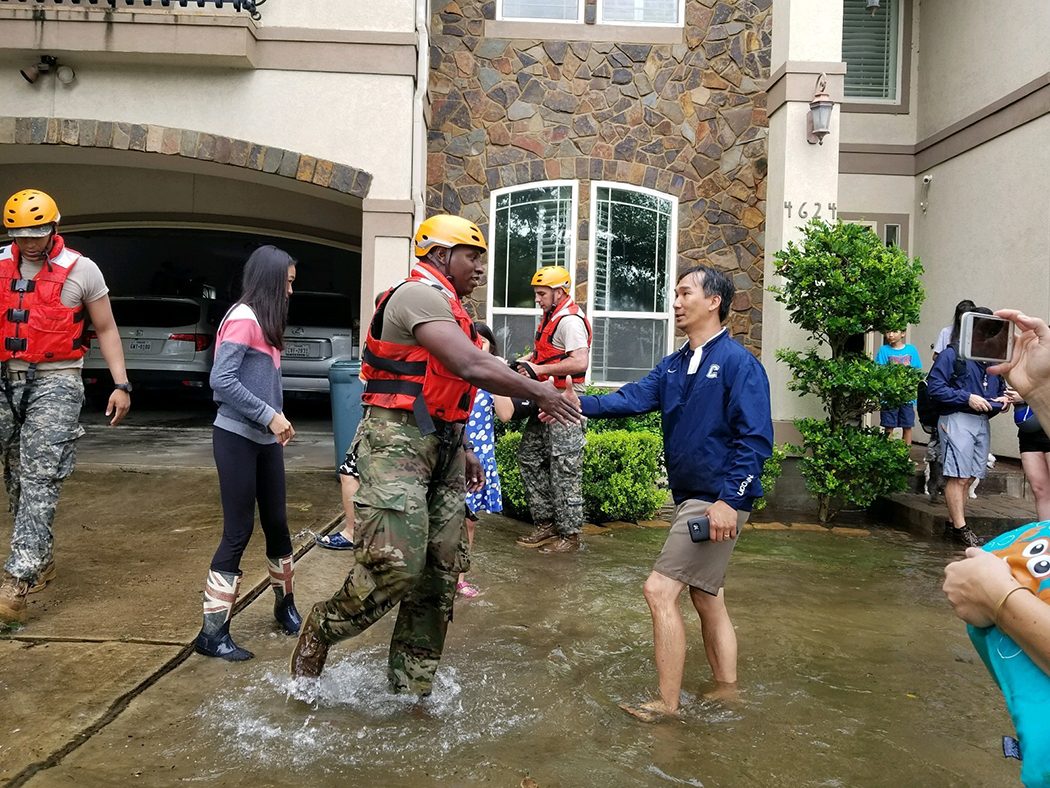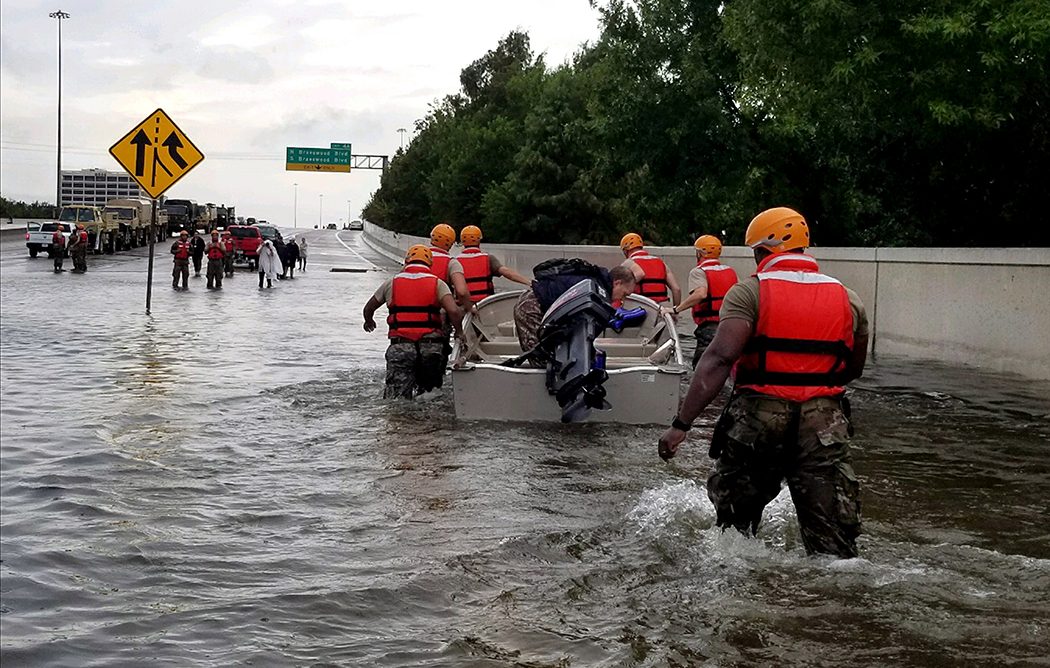
Woodrow teacher Michah Hill assists flood victims in Houston following Hurricane Harvey. (Photos by Lt. Zachary West , 100th MPAD)
Call of duty
Micah Hill was at a professional development meeting at Woodrow Wilson High School in August when he received a text that would send him into the teeth of the most costly disaster in Texas history.
Though he teaches engineering at Woodrow, Hill also is a second lieutenant in the Texas National Guard, and has been since he graduated from Tuskegee University in 2010. The text sought an officer who could assist with Hurricane Harvey. He had 24 hours to respond. “Wow, this is real,” he thought.
Hill accepted immediately, reassured by his commander that the job would last no more than a weekend. He shipped out on Aug. 23, not knowing he’d spend the next three weeks wading through the devastation Harvey left behind.
While he had never been deployed before, he was prepared. Having recently completed his Basic Officer Leadership Course, he was eligible to assist in natural disasters or conflict zones.
He headed south with his gut a whirlwind of fear, anxiety and excitement.
Hill trained for these moments. He practiced loading up the proper equipment, coordinating rendezvous points with the rest of the forces and various safety techniques. But a natural disaster like Harvey was not in any manual.
Wind speeds hit 130 mph when the hurricane collided with the Texas coast, dumping up to 40 inches of rain in some places. When the skies finally cleared, 89 people were left dead, nearly 185,000 homes were damaged and almost 40,000 people were displaced.
Hill’s unit was assigned to a task force that assisted fire fighters and police officers rescuing civilians who were trapped by flooding in Houston. First responders poured in from all over the country to aid and train the National Guard, and Hill’s unit received a crash course in water rescues.
As the unit rolled out, what Hill saw didn’t seem real. “It was surreal. A disaster,” he remembers. “There was nothing recognizable from everyday life.”
Hill’s unit’s mission was to rendezvous with other first responders at a fire station in West Houston, but after Hill’s first Humvee flooded, things looked tenuous. They switched to a larger truck, but were still unable to clear the 8 feet of water that covered Loop 610 on their way to the meet up.
While looking for an alternate route on side streets, they quickly realized that the water was going to keep them from their mission. After finding a neighborhood of residents stuck in flooded homes, they made a quick decision to begin rescuing Houstonians. They collected people fleeing the flooding, ferrying them to churches and the convention center.
It was organized chaos.

Woodrow teacher Michah Hill assists flood victims in Houston following Hurricane Harvey. (Photos by Lt. Zachary West , 100th MPAD)
Hill felt pulled between helping others save their memories and keeping a tight schedule to ensure everyone was rescued. He knew how difficult it must be to have just minutes to decide what to keep, knowing everything left behind could be destroyed.
“How can they grab what they need in two minutes?” he wondered. “Is that humane?”
When he picked up a family, it didn’t always result in a simple trip to a shelter. They might have family down the street in need of rescue, or ask to be dropped off somewhere else across the city. The stress mounted, but Hill knew he had to keep his composure. “You can’t just be barking at people,” he says.
In a culture that respects authority and chain of command, it was a risk to not follow through with the mission to get to the fire station, but Hill and his unit saw no other option.
“People are in need. We can’t just leave them here,” he says.
Over the next two hours, Hill and his unit rescued 52 residents. Jumping out of his truck, Hill splashed through waist-deep water to pull people from their flooded homes. They were the first responders of any kind to hit the area.
For the next few days, it was a whirlwind of deliverance as helicopters, boats and trucks made a mad dash to get people out of their waterlogged residences. It wasn’t all done by the book, but the situation called for a little rule-bending to help people.
“No one can say you are doing this wrong when you are helping a baby get out of the house while the mom has two other children who can’t walk through the water,” he says.
Hill later partnered with a civilian and his bass boat, rescuing children and families in West Houston. The man stayed in town just to help his neighbors who couldn’t evacuate. Hill traveled through the swamped streets with this civilian, rescuing countless other Houstonians, even appearing on CNN’s Twitter feed in a stunning photo of a water rescue.
“Everyone showed some type of heroism,” he says modestly.
After two and a half sleepless days of rescues, Hill and his unit finally were going to get some rest, when he heard sirens and saw ambulances pull up to their hotel. Each ambulance had dozens of people packed in, including a disabled man who couldn’t walk. They needed shelter. Hill strapped his boots and ensured everyone was taken somewhere safe for the night.
In three days, his unit rescued nearly 200 people from the devastation. During his time in southeast Texas, he slept in hotels, vehicles and even spent a night in Gallery Furniture, owned by Bishop Lynch alumnus Jim “Mattress Mac” McIngvale that was open to all victims of the hurricane.
Hill’s transition back to being a father, husband and teacher was an adjustment after what he experienced in Houston. Lesson plans, data meetings and day care pick ups are a far a cry from flooded rescues. Though he showed bravery in the face of disaster and risked his own life to save others, he remains humble and reflective on the way everyone came together.
“None of us are heroes,” Hill says of the National Guard. “The people who stayed and came in to volunteer, not getting paid, and doing it on their own dime, they are amazing.”





